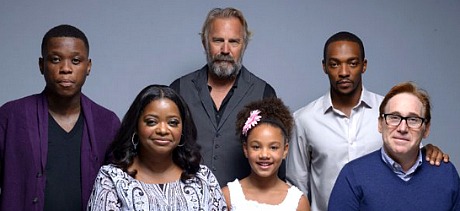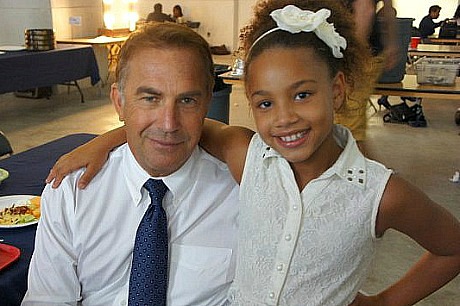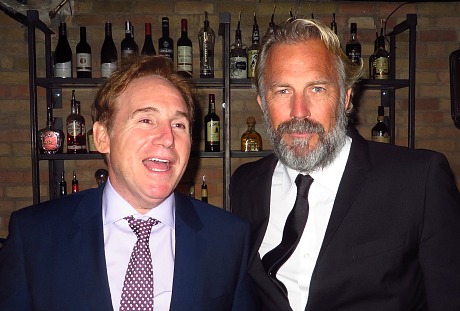Click here to jump past HE Sink-In

“There’s no black or white, left or right to me any more…there’s only up or down.” — Bob Dylan as quoted by Martin Scorsese in No Direction Home: Bob Dylan.
When I first saw Mike Binder‘s Black or White last summer I knew that Kevin Costner‘s performance as Elliot, an angry, grieving attorney who’s drinking too much, was one of his all-time best. Not just a well-measured performance of skill and feeling but one that was “up” in a Dylanesque sense. Which is to say a kind of head-turner, which is to say a kind of high. Because it was basically about the old Jimmy Cagney thing of “planting your feet, looking the other guy in the eye and telling the truth,” which meant no crapping around with those little charm-school games that actors sometimes resort to. And it wasn’t one of Stanley Kubrick‘s “interesting” performances either. It was take-it-or-leave-it real which, in my mind, is always an “up” thing because the technique is more or less invisible.
Costner, I felt, had gotten under the skin of this somewhat testy grandfather of a mixed-race girl and made him whole, but he had also shown courage in playing Elliot in the first place. Because he and Binder pretty much did it alone.
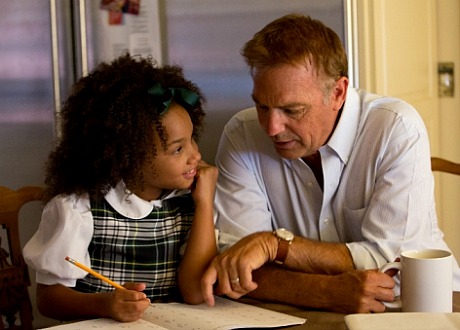
This is a town, after all, that lives by caution, cowardice and complacency for the most part, and here was a big-name actor kicking off the third act of his career by playing a guy he knew wouldn’t settle in all that well with the brownshirt p.c. crowd and was even reaching into his own pocket and paying for a good portion of the budget. It’s all well and good to give a stirring performance but behind-the-camera cojones on top of this is just too rare. Attention must be paid.
Michael Keaton showed another kind of courage when he played a reflection of who he could be (but isn’t in certain respects) in Birdman. A 60ish actor who was super-big in the ’80s and ’90s when he played a mythical superhero, but trying to redefine and maybe transcend things on the New York stage. Who could miss the parallels, right?
Costner is three or four years younger than Keaton but has been on a similar ride — hot in the ’80s, ’90s and early aughts, but hammering and punching the bag and showing perhaps a tiny bit more moxie than Keaton, starring in a racially-flavored child-custody drama that Costner knew would stir the pot and maybe agitate the hornets and shelling out $4 million to get the film made. And hustling to get the right distribution deal and currently taking shit because Black or White doesn’t slavishly follow the “sensitive” liberal line about the black-white chasm and the stereotypes that cling to that, especially in today’s incendiary climate (“I Can’t Breathe”).
And yet Keaton is just as beautiful in his own way in Birdman. I just can’t decide who’s sitting on the higher perch right now but there’s an argument, surely, for giving Costner a kind of intestinal fortitude award. Partly because his conviction comes through in his performance, and partly because the ways in which he scores have been in some ways misunderstood. And partly because Eliot says a few dead-on things towards the end of the film.
If you want to understand Costner’s Black or White character you just need to read his big third-act courtroom rant. Elliot is facing a child custody challenge from Rowena (Octavia Spencer), the grandmother of Elliot’s granddaughter Eloise and the mother of Eloise’s unstable, not-all-that-together dad, Reggie (Andre Holland). The climax finds Elliot is in the box and being questioned by Rowena’s African-American attorney (Anthony Mackie) about matters of race and character.
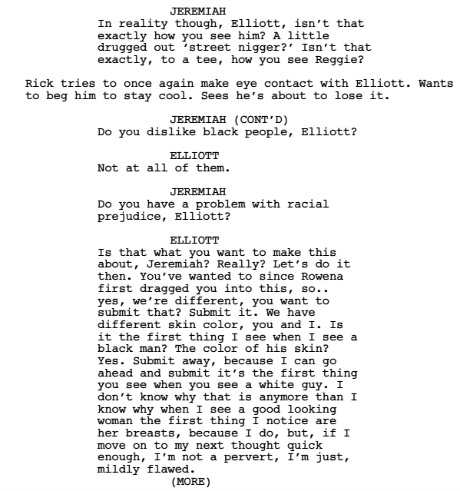
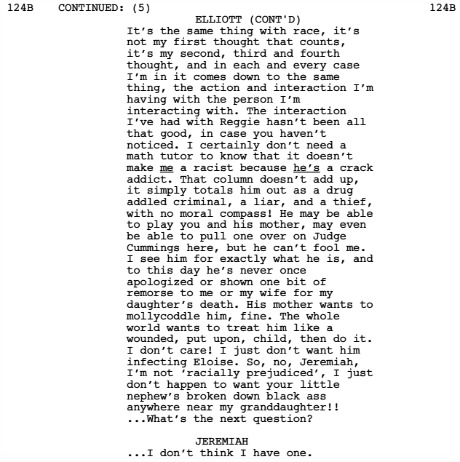
And that’s it, man. That’s pretty much why Costner made this film and gave this performance. To say what very few films about drama and get-downs among different shades of people will say, which is that pretty much everyone is, in a sense, “racist” in that the differences are the first thing we all see, but our second, third and fourth thoughts are the final definers. “Not the color of our skin but the content of our character,” as Martin Luther King said 50-something years ago. Okay, sure, we know that, a homily…but it never hurts to be reminded. Eternals have a place. I think the ending just whams it right down.
I saw Black and White last July with a bit of skepticism and concern, and I came out surprised and impressed. It doesn’t placate or soothe but it’s not snarly or inflammatory either. It just talks straight and open about…well, more than just racial matters. It takes a hard look at responsibility and parenting and racial identity and who’s really feeling what. And that’s too brief a description about what it really gets into. Everyone puts on their tiptoe shoes when any kind of racial subject comes up in any context, but not Black or White. It plays it mild and sad and blunt and angry. It’s a lot more candid and straight-from-the-shoulder than you might expect.
In short, Costner and Binder have done the right thing. Costner especially because his hide is on the line. What a town this would be if more big-name actors stood up and did this kind of thing on a regular basis.
